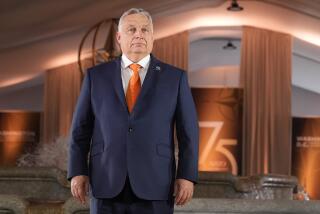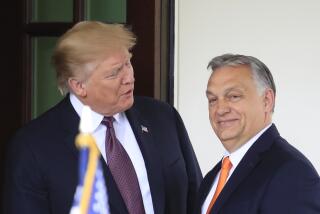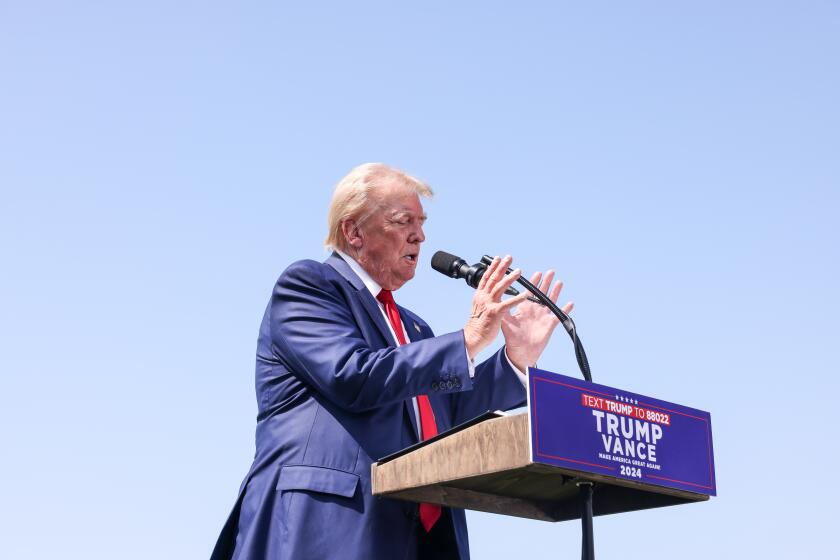Bush Hailed in Hungary, Lauds Reforms
BUDAPEST, Hungary — An exuberant President Bush, cheered by throngs of Hungarians who greeted him in a thunderstorm here Tuesday, declared that the United States stands with Hungary in what he called “an unprecedented experiment--a Communist system seeking to evolve toward a more open and pluralistic system.”
Bush, bringing his campaign for a “free and open Europe” to Budapest after a two-day visit to Poland, gave a ringing endorsement to the free-enterprise system and engaged in warm exchanges with Hungarian Communist Party officials about prospects for the private sector to help Hungary solve its economic problems.
“The key to economic success is letting the market do its work,” Bush told state and party officials at a dinner at the Hungarian Parliament. “That means an end to inefficient government intervention in the marketplace--an end to the dead weight that drags down overall economic growth. It means factories and enterprises of all kinds playing by the rules of the marketplace--according to the laws of supply and demand.”
Earlier, in a toast to Bush, Rezso Nyers, a veteran economic reformer who recently was installed as president of the ruling Socialist Workers’ Party, said Hungary is “now in a state of radical transformation” and is counting on international cooperation to achieve a recovery of its economy and “create modern, competitive structures.”
Unlike Poland’s reform movement, which originated outside the Communist Party, Hungary’s drive for reform has come from within the party. In political reform Hungary lags behind Poland, which recently held the first free election of a legislative body in the East Bloc. However, Hungary has been moving steadily toward a multi-party system, and national elections are scheduled for next year.
At the same time, Hungary’s economic reforms, especially in encouraging development of the private sector, have moved far ahead of Poland. The Japanese are investing heavily in Hungary, for example, according to U.S. officials, but are shying away from Poland, apparently not convinced that it offers a hospitable and profitable setting for investments.
Highway signs hailing international concerns doing business in Hungary lined part of the route of the motorcade bringing the President and his wife, Barbara, from the airport. The state-operated television network, which regularly carries advertisements, carried an ad Tuesday promoting the sale of a coin commemorating Bush’s visit here.
Thousands of Hungarians lined the route of Bush’s motorcade for several miles in downtown Budapest. And a huge crowd, waving American flags and holding umbrellas, greeted him at historic Kossuth Square. It was there, in the shadow of Parliament, that unarmed demonstrators bent on reform were killed by secret police firing from nearby rooftops in the 1956 uprising against Communist rule.
National President Bruno Straub, calling attention to the 1956 slaughter as he welcomed Bush, deplored the loss of lives and said, “We are now having another reform era in Hungary, but we do believe the historic order of events will be different this time.”
With historic changes unfolding in the Soviet Union and throughout Eastern Europe, Straub said, Hungary is poised to carry out its own reforms and help make “international trends irreversible.”
Bareheaded in the Rain
Bush, standing bareheaded in a soaking rain and amid occasional lightning and thunder, delighted the crowd by discarding his prepared text and speaking only briefly at the welcoming ceremony.
Holding up several sheets of damp paper after he was introduced, Bush exclaimed: “I’m going to take this speech and I’m going to tear it up.
“You’ve been standing here long enough,” Bush continued as the crowd applauded. “But Barbara and I feel the warmth of this welcome, and the rain doesn’t make a darn bit of difference. We feel at home right here. “
Hungarians, who are accustomed to more formal speeches by East European political leaders, cheered Bush’s informal, almost folksy, style. Peter G. Feher, a Hungarian journalist covering Bush’s visit, called the extemporaneous remarks “very appropriate.”
Discarding the prepared speech “is very near to the Hungarian mentality, what Bush did, to symbolize that he is one of us and can speak directly to the people,” Feher said.
Woman Gets Bush’s Raincoat
Upon completing his remarks, Bush rushed from the platform, removed his tan raincoat and presented it to an elderly woman who had been standing at the front of the crowd for several hours and was thoroughly soaked.
The President and his party then hurriedly walked to the nearby ornate Parliament building, where he spoke glowingly of the free-enterprise system in an exchange of toasts with lawmakers.
“In Hungary today,” he declared, “there is a deepening consensus on the direction that reform must take, on a new model for state and society--in economics, the competitive market, in politics, pluralism and human rights.”
The current reform program, he said, is only the beginning. “I see in Hungary’s future a country of hundreds of thousands of small enterprises--sources of innovation, productivity and prosperity. And I see in Hungary’s future new voices speaking out, shaping the course of national affairs.”
As Bush was leaving the Parliament, a reporter asked what he would do for a raincoat if it rained again.
“It’s not going to rain any more,” declared Bush, who has obviously enjoyed his East European visit. “It’s not going to rain on my parade.”
The President plans to announce a program of financial and technical aid for Hungary when he speaks today at the Karl Marx University of Economics here.
Although details of the program have not been disclosed, it is believed to be patterned along the lines of the modest, six-point program Bush announced for Poland.
More to Read
Get the L.A. Times Politics newsletter
Deeply reported insights into legislation, politics and policy from Sacramento, Washington and beyond. In your inbox three times per week.
You may occasionally receive promotional content from the Los Angeles Times.










